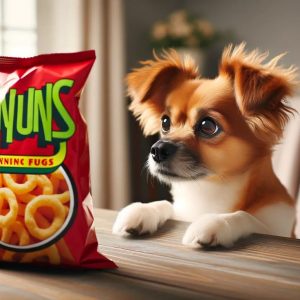Hey there, snack enthusiasts and pet owners alike! Let’s chat about a snack that’s captured the taste buds of many: Funyuns. You know, those irresistibly crunchy, onion-flavored rings that always seem to disappear from the snack bowl a little too quickly? Yep, those are the ones!
In this article, we’re diving into the world of Funyuns and taking a closer look at what makes them so popular among snack lovers. But here’s the twist: we’re also going to explore how these tasty treats might affect our furry friends – our beloved pets.
So, whether you’re munching on Funyuns during movie night or wondering if your pet can join in on the snacking fun, we’ve got you covered. Let’s unravel the mysteries of Funyuns and discover what pet owners need to know about this iconic snack. so join us and learn about weather can dogs eat Funyuns or not?
What are Funyuns? Can Dog Eat Funyuns?

Overview:
Funyuns are a well-known brand of snack produced by Frito-Lay, renowned for their distinctive onion flavor and satisfyingly crunchy texture. These snacks have become a staple in the world of munchies, offering a unique twist on traditional corn-based snacks.
Ingredients:
The main ingredients in Funyuns include cornmeal, vegetable oil, and a special blend of spices and flavorings, notably onion powder. These ingredients come together to create the signature taste that Funyuns are famous for. Additionally, Funyuns are crafted in a ring-shaped design, making them not only delicious but also fun to eat.
Manufacturing Process:
Funyuns are manufactured using a process that involves mixing the cornmeal and flavorings, forming the mixture into ring shapes, and then frying them until they achieve the perfect crispy texture. Once fried, they are seasoned to perfection before being packaged and made available for snacking enjoyment.
Appearance and Texture:
Funyuns are characterized by their distinct ring shape and light, airy texture. They have a satisfying crunch with just the right amount of crispiness, making them a favorite snack choice for many.
In summary, Funyuns are a delicious snack option that combines the savory taste of onions with the satisfying crunch of corn-based snacks. Their unique flavor and texture have made them a beloved snack choice for people of all ages.
Nutritional Content of Funyuns
High Sodium Levels:
Funyuns are known to contain high levels of sodium, primarily due to the salt used in the seasoning. Excessive sodium intake can lead to health issues such as high blood pressure and cardiovascular problems, both in humans and pets. It’s essential to monitor sodium intake, especially for individuals with pre-existing health conditions.
High Fat Content:
Funyuns typically have a high-fat content, mainly from the vegetable oil used in their production process. Consuming foods high in fat can contribute to weight gain and obesity, which can increase the risk of various health issues in both humans and pets. Therefore, moderation is key when indulging in snacks like Funyuns.
Artificial Additives:
In addition to sodium and fat, Funyuns may also contain artificial additives such as preservatives, flavor enhancers, and food colorings. These additives are often used to enhance the taste, texture, and appearance of the snacks but may have adverse effects on health if consumed excessively. Pet owners should be cautious when offering snacks with artificial additives to their furry companions.
Health Implications:
Regular consumption of Funyuns, both for humans and pets, can have several health implications. These may include weight gain, cardiovascular issues, digestive problems, and nutrient deficiencies. While Funyuns can be enjoyed occasionally as a treat, they should not be a staple in the diet of humans or pets.
Funyuns are a tasty but nutritionally lacking snack option due to their high sodium, fat, and artificial additive content. Pet owners should be mindful of the potential health implications of regularly feeding Funyuns to their furry friends and opt for healthier snack alternatives whenever possible.
Can Pets Eat Funyuns?

High Sodium Content:
Funyuns are notorious for their high sodium content, primarily due to the salt used in their seasoning. Excessive sodium intake can be harmful to pets, leading to health issues such as increased thirst, dehydration, electrolyte imbalances, and even sodium toxicity in severe cases. Therefore, feeding Funyuns to pets, especially in large quantities, is not recommended.
Artificial Ingredients:
In addition to high sodium levels, Funyuns may also contain artificial additives such as preservatives, flavorings, and colorings. These additives can be problematic for pets, as they may cause digestive upset, allergic reactions, or other adverse health effects. Pet owners should be cautious when offering snacks with artificial ingredients to their furry companions and opt for natural, pet-friendly treats instead.
Obesity Risk:
Funyuns are high in fat and calories, which can contribute to weight gain and obesity in pets if consumed regularly. Obesity is a significant health concern for pets and can lead to various health issues, including joint problems, diabetes, and cardiovascular disease. Therefore, it’s essential to limit the intake of high-fat and calorie-dense snacks like Funyuns to maintain a healthy weight for pets.
While Funyuns may be a tempting snack for pets due to their crunchy texture and savory flavor, they are not suitable for regular consumption. The high sodium, fat, and artificial ingredient content of Funyuns pose potential health risks for pets, including digestive upset, obesity, and sodium toxicity. Pet owners should prioritize their furry friends’ health and well-being by offering them balanced, nutritious diets and avoiding feeding them human snacks like Funyuns.
Risks and Considerations
Pet Size and Health Status:
The size and health status of a pet can significantly impact their tolerance to certain foods, including snacks like Funyuns. Smaller pets, such as toy breeds or cats, may be more susceptible to adverse effects from consuming high-sodium or high-fat foods due to their smaller body size. Similarly, pets with underlying health conditions, such as kidney disease or obesity, may be more sensitive to the negative effects of Funyuns and other unhealthy snacks.
Digestive Upset:
One common risk associated with feeding Funyuns to pets is digestive upset. The high-fat content and artificial additives in Funyuns can be difficult for pets to digest, leading to symptoms such as vomiting, diarrhea, abdominal pain, and gas. Pet owners should monitor their pets closely for any signs of digestive discomfort after consuming Funyuns and avoid feeding them any more of the snack if adverse reactions occur.
Sodium Toxicity:
Pets are more sensitive to sodium than humans, and consuming foods high in salt, such as Funyuns, can lead to sodium toxicity. Symptoms of sodium toxicity in pets may include increased thirst, excessive urination, dehydration, lethargy, tremors, seizures, and even death in severe cases. Pet owners should be mindful of the sodium content in snacks like Funyuns and limit their pets’ intake to prevent sodium-related health issues.
Overall Diet and Balance:
Feeding Funyuns to pets should be considered within the context of their overall diet and nutritional balance. While an occasional small bite of Funyuns may not pose significant harm to a healthy pet, it should not be a regular part of their diet. Pet owners should prioritize feeding their pets a balanced, species-appropriate diet consisting of high-quality pet food and occasional, pet-safe treats to ensure their nutritional needs are met.
While Funyuns may seem like a tasty snack to share with pets, there are several risks and considerations to keep in mind. Pet owners should be aware of the potential for digestive upset, sodium toxicity, and other adverse effects associated with feeding Funyuns to their pets.And they should keep in mind that weather can dog eat Funyuns or not? It’s essential to monitor pets closely for any signs of discomfort or illness after consuming Funyuns and to prioritize their health and well-being by offering them a balanced and nutritious diet.
Expert Opinions and Recommendations

Veterinary Insights:
Veterinarians and animal nutritionists generally advise against feeding Funyuns and similar snacks to pets due to their high sodium, fat, and artificial ingredient content. These experts warn that regular consumption of such snacks can contribute to obesity, digestive upset, sodium toxicity, and other health problems in pets. Instead, they recommend opting for pet-safe treats specifically formulated to meet pets’ nutritional needs without compromising their health.
Alternative, Healthier Snack Options:
Experts suggest offering pets alternative snack options that are healthier and safer for consumption. Pet owners can choose from a variety of pet-safe treats available on the market, such as dehydrated meat treats, dental chews, and vegetable-based snacks. These alternatives provide pets with a satisfying and nutritious snack experience without the risks associated with human snacks like Funyuns. Additionally, pet owners can offer small amounts of fresh fruits and vegetables, such as carrots, apples, and green beans, as occasional treats for their pets.
Guidance on Providing a Balanced Diet:
In addition to selecting appropriate snack options, experts emphasize the importance of providing pets with a balanced and species-appropriate diet. This includes feeding them high-quality commercial pet food that meets their specific nutritional requirements based on factors such as age, size, breed, and activity level. Pet owners should consult with their veterinarian or a qualified animal nutritionist to develop a feeding plan tailored to their pet’s individual needs and preferences. By prioritizing a balanced diet and offering suitable snack options, pet owners can help ensure their pets’ long-term health and well-being.
Expert opinions and recommendations caution against feeding Funyuns and similar snacks to pets due to the potential health risks involved. Instead, pet owners are encouraged to explore alternative, healthier snack options that provide pets with both enjoyment and nutritional benefits. By following expert guidance and prioritizing their pets’ dietary needs, pet owners can help promote their pets’ overall health and longevity.
Signs of Toxicity or Illness
Digestive Upset:
Pets may experience gastrointestinal issues such as vomiting, diarrhea, or abdominal discomfort after consuming Funyuns or other unhealthy snacks. These symptoms may indicate digestive upset and can range from mild to severe depending on the amount consumed and the pet’s individual tolerance.
Lethargy and Weakness:
Pets may exhibit signs of lethargy, weakness, or decreased activity levels after ingesting Funyuns or other potentially toxic substances. These symptoms may suggest underlying health issues or toxicity and should be taken seriously, especially if they persist or worsen over time.
Increased Thirst and Urination:
Excessive salt intake from snacks like Funyuns can lead to increased thirst and urination in pets. If a pet drinks more water than usual or has frequent urination episodes after consuming salty snacks, it may indicate sodium toxicity and should prompt immediate veterinary attention.
Changes in Appetite or Behavior:
Pets may experience changes in appetite or behavior following ingestion of Funyuns or other unhealthy snacks. This can include reluctance to eat, unusual food preferences, or alterations in normal behavior patterns. Pet owners should monitor their pets closely for any such changes and seek veterinary advice if they persist or worsen.
Seeking Veterinary Care:
If pet owners observe any of these signs or suspect that their pet has ingested Funyuns or other potentially harmful substances, it’s essential to seek veterinary care promptly. Veterinarians can assess the pet’s condition, provide appropriate treatment, and offer guidance on managing any associated health issues. Early intervention can help prevent further complications and promote the pet’s recovery.
Pet owners should be vigilant in monitoring their pets for signs of toxicity or illness after consuming Funyuns or other unhealthy snacks. Recognizing these signs early and seeking veterinary care promptly can help ensure the pet’s well-being and minimize the risk of serious health complications. By staying informed and proactive, pet owners can play a crucial role in safeguarding their pets’ health and happiness.
Conclusion
In summary, it’s important to prioritize your pet’s health and well-being by being mindful of the snacks you offer them. Funyuns, like many other processed snacks, contain high levels of sodium, artificial additives, and unhealthy fats, which can pose risks to pets if consumed in large quantities. Feeding Funyuns to pets can lead to digestive upset, sodium toxicity, obesity, and other health issues. Instead of offering Funyuns or similar snacks to pets, consider providing them with healthier alternatives such as fresh fruits, vegetables, or pet-safe treats specifically formulated for their dietary needs.
If you have any concerns about your pet’s diet or suspect they have ingested something harmful, don’t hesitate to consult with a veterinarian. They can provide personalized advice and guidance based on your pet’s individual health status and dietary requirements. By promoting a balanced diet and making informed choices about their nutrition, you can help ensure your pet leads a happy, healthy life.